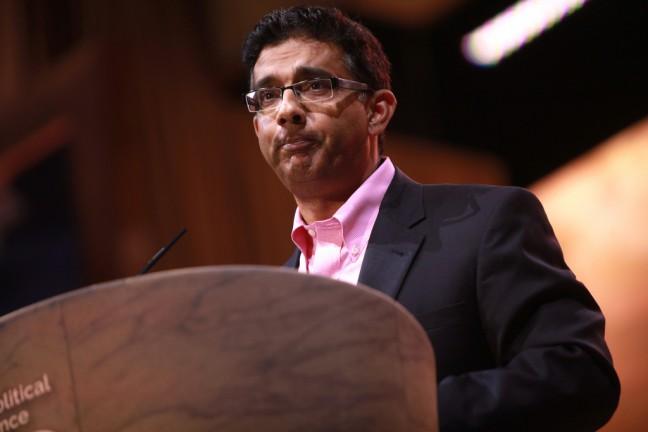Students, faculty and community members gathered Tuesday night in the Social Sciences building to listen to political commentator and author, Dinesh D’Souza, offer a leftist’s interpretation of diversity and justice.
An immigrant from India, D’Souza came to America and attended Dartmouth College. After graduating he became a political commentator. His most recent works include “Obama’s America” and “America: Imagine a World Without Her.”
To explain the leftist’s diversity, D’Souza covered the three types of justice in America — criminal, economic and racial.
Speaking from personal experience, D’Souza explained how he had to face the U.S. criminal justice system in 2014 when he was put on trial for making illegal campaign contributions to a friend running for the New York Senate in 2012.
D’Souza said he committed the crime, but said he had only given more than the limit in campaign contributions to help his friend. Unlike other people who have spent over the limit, D’Souza said he did not expect anything in return for his contributions.
D’Souza compared his eight-month confinement center sentencing to a significantly smaller sentence that another man who gave illegal campaign contributions received.
D’Souza said he realized justice is more than if a person is guilty of a crime, but whether the penalty administered is fair and consistent with the penalties other people receive for similar crimes.
“If those conditions are not met, then you don’t really have justice — you may put up the name justice … but you are not really getting justice at all; you are getting a sham,” he said.
D’Souza suggested the concept of justice in the U.S. is murkier than citizens realize, due in part to the country’s powerful plea-bargain system.
Pivoting away from criminal justice, D’Souza discussed economic justice, which he finds at the center of the political debate between Democrats and Republicans.
Fairness is the core value of the Democratic party, D’Souza said. The Obama administration believes “people should have their fair share,” D’Souza said, adding it is important to consider what a “person’s fair share” truly means.
D’Souza argued Democrats often say the top 1 percent of Americans should pay higher taxes. But Democrats don’t put a limit on how much they pay until they have supposedly paid their “fair share,” he said.
D’Souza said people who make enough money to fall in the top 1 percent are often entrepreneurs. They come up with ideas to develop new products, taking risks to create them before people even realize they need them, he said.
“How are people like [entrepreneurs] depriving anyone like us of our fair share,” D’Souza said. “In what respect have you been cheated when you [voluntarily] line up to pay money for the next newest iPhone [they have taken the risks to create]?”
Regarding racial justice, D’Souza suggested people in America need to rethink American assumptions and accusations.
D’Souza argued Democrats largely put the blame for racial injustices on America itself, when historically they are to blame for many racial injustices.
Going as far back as the Civil War, D’Souza said Democrats were the ones who opposed the end of slavery and, following the end of the war, proceeded to deny amendments that would allow black people to vote and gain rights.
Much of this injustice continued throughout the 20th century, despite arguments Democrats had “switched sides” and were leaders of social justice movements, D’Souza said
D’Souza said he hoped his view on justice opens young students to the possibilities beyond the prevailing narratives in America.
“Wake up young man, wake up young woman, don’t take it received from the spoon,” D’Souza said. “The facts are actually there, but it’s hard to put them together because you have to do it all by yourself.”



















